Marry, sirs and madams and those of all genders, I shall commit no false report; moreover, I will speak no untruths; secondly, I shall not be a slanderer; sixth and lastly, I shall belay a jovial account; thirdly, I shall verify only just things pertaining to this account; and to conclude, I send ye my most polished praises to this Storytellers: A Theater Arts Academy’s production of Much Ado About Nothing. Hopping houses, which for Storytellers has become somewhat of a transitive tradition, the company takes all their fine student-aged talent on the road again, this time to Christ Reformed Presbyterian Church in Laurel. Directed by Ryan Neely, Much Ado About Nothing takes the more traditional textual approach that the Bard intended for his comedies, but with a fun-loving summer flare that will keep all theatergoers cool and comically engaged during this sweltering summer weekend weather.
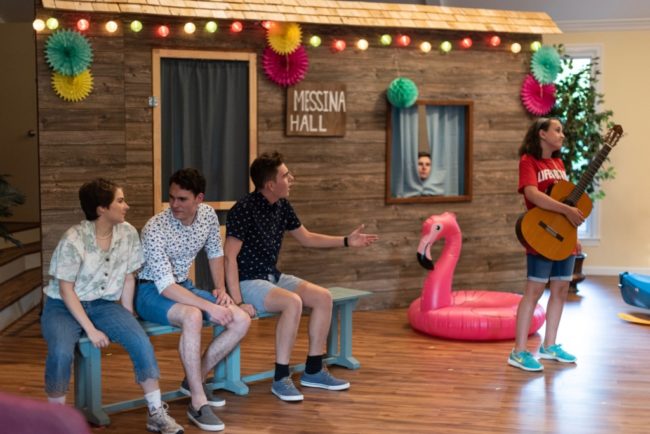
Welcome to Camp Messina! Think cabin in the woods, summer camp, and pool-side party and you’ll be on the right track for a good-old-fashioned summer-fun Shakespearean comedy. Whilst director Ryan Neely stays true to the text (an ad-lib here and there for modernity and humor’s sake hardly counts toward deviation) the infusion of concept and its nuptial to invigorating aesthetic is both innovative and on par with the quality productions that Storytellers: A Theater Arts Academy has become known for delivering. Under the guidance and diligence of Artistic Director Terry Sweet Bouma and Produced by Alyssa Bouma, Neely, the production crew, and talented young performers create a production most memorable, most agreeable, and most entertaining.
Alex and Alexa— sounds like it could be the start of a comedy of errors all its own, doesn’t it?— but Alex Foley and Alexa Cripe are the masterminds behind the show’s aesthetic. Foley, tackling scenic concept, construction, dressing, and props, draws the show into Neely’s concept of “cabin in the woods summer” while Cripe fabricates stylish touches to compliment this notion but at the same time brings a raging modern flare and even local flavor to the show’s sartorial selections. Without plunging the depths of Lake SetDesignaCostumey, though plenty of praise is well deserved of both for all of their impressive efforts, it can be said, moreover, that Foley and Cripe have committed brilliant artistry; secondly, they are imaginative— just look at the giant flamingo round raft and the dueling Princess dresses for sisters Antonia and Leonata during the iconic masquerade ball scene— sixth and lastly, they have fashionably suited all the performers in the production (whether with brilliant hiding places for the dueling guiling scenes of Beatrice and Benedick or with sharp, charming Naval Academy uniforms); thirdly, they have done justice to Neely’s directorial pursuits; and to conclude they are masters, not knaves, of design and execution.
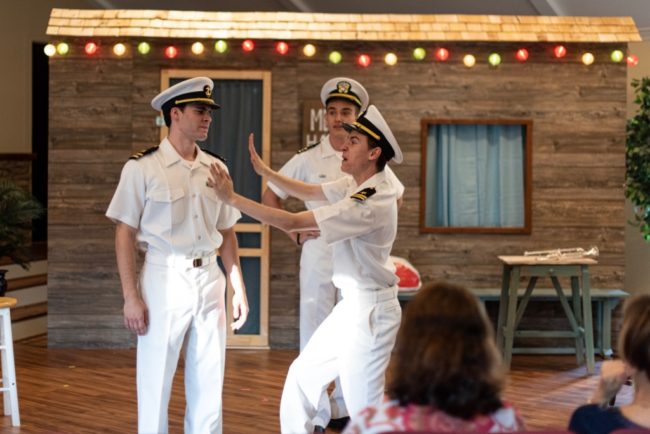
Director Ryan Neely has molded these talented young performers in such a way that allows them to openly and freely access Shakespeare’s archaic text without altering its unique style, which ultimately makes it Shakespeare. Blocking is critical in Much Ado About Nothing, particularly for the more humorous scenes— the guiling of Benedick and Beatrice come immediately to mind— and Neely succeeds in finding honest comic humors in both of these scenes, exacerbating possibilities for laughs without asking too much of his audience by way of suspension of disbelief. The comic overtones that rule the play are focused upon and embraced, allowing all the funny titbits of Shakespeare’s writing to surface readily. But praise should also be handed over to Neely for his ability to sharply shift the focus of the show’s emotional current. Flipping from flippantly funny to dead serious at the chapel scene at the top of second act, Neely encourages the performers to home in on those brutally honest emotions, dragging the raw and unpleasant energies of that scene to override the light-hearted humor created in the play up until that point. The transformation is striking; the juxtaposition to the rest of the play’s feathery tone is astonishing.
With just 19 performers, this Much Ado About Nothing is as engaging as it is humorous, intriguing as it is hilarious, and ultimately has a delightful performance niche for each person involved. Where does one even start to sing the praises of this wildly entertaining group of talented teens? How about with the night watch, a place as good as any, one supposes. George Seacole (Lilly Foley), Hugh Oatcake (Dorothy Boswell), Hugo Cornmeal (Heidi Wagner), and Verges (Andrew Ball) hysterically “hup-hup-hup” their way through every entrance and exit, high-marching in and out of the play space as the shenanigans that shroud ‘round these general players implode. Foley, Boswell, and Wagner can be seen doubling up throughout the production as ‘servants’ (read: camp-counselors based on their fashion choices) among others, and have humorous little gestures and movements in which they define themselves. Ball, as the second-in-command Verges, is a hilarious little sidekick to the indescribable Dogberry (Broinninn Cummins.) Dressed like a Park Ranger or Scout Leader, which matches the patched-within-an-inch-of-its-life Girl Scout Sash worn by the Verges character, Cummins is hysterical in the role of Dogberry, and please let it be writ in black and white— she was called ass!
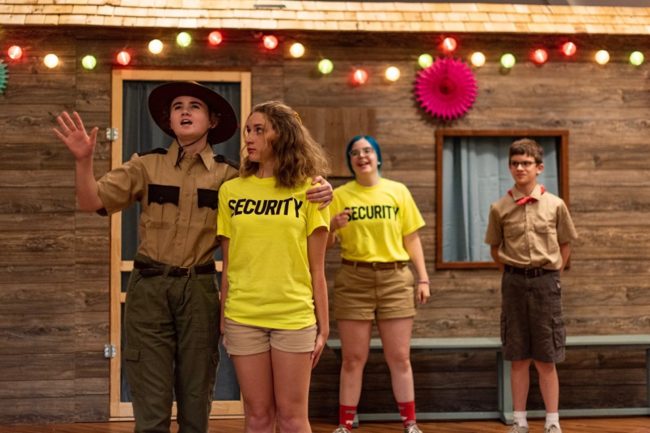
Of course, without false knaves (or not false knaves?) the aforementioned bumbling bunch of comedic relief would have nothing to set their sights upon! Conrad (Violet Salada) and Borachio (Thomas Schueckler) are two such, keeping company with the odious Don John (Lucas Schueckler.) Thomas Schueckler, the rogue paaartaaay animal, as it were, gets the whole “shame Hero” plot rolling down the hill, with the aided company of poor Margaret (Amelia Thomas, who presents a decidedly sage and sound scene with Benedick later in the production, belaying wisdom beyond the actress’ years and beyond the character’s general lack of morals), and creates a great big whopping mess for the stumble-bumble patrol, the quartet of questionable “lawmen” to in fact tumble upon. When those aforementioned four lay siege upon the boastful Borachio, and poor “wrong place, wrong time,” Violet Salada as sidekick Conrad, maniacal mayhem ensues. Lucas Schueckler, as the bitter Don John, does an exquisite job of moping about the stage, sulking and brooding like the treacherous knave that his character ought to be. What brings all of these shenanigans together is the hysterical, scene-stealing facial expressions of the Sexton (Katherine Thomas, who doubles up as Friar Francis among others throughout the performance.) Thomas, whose patience is as tenuous as melting ice in this current heat wave, plays out her exasperations vividly upon her face and just adds to the hilarity in the “examination” of the “false knaves.”
The unsung hero of the production, who arrives at the masquerade ball ironically dressed like Where’s Waldo?, is the musically inclined Balthazar (Naomi Sushereba-Smith.) Whilst seemingly a background player, it is Sushereba-Smith’s lilting musical affairs that gets the guiling of Benedick scene underway, and she actually plucks the guitar and sings on stage. Before the rousing, carousing, chorus of loons overtakes her and she’s left to hilarious facial expressions. Ursula (Eden Logan), has a most memorable cameo scene a well, during the guiling of Beatrice, being the dominant paint brush that ‘paints the scene’ well in hand, and in face. Both Logan and Sushereba-Smith are critical components to the success of what are arguably the two funniest scenes in the production.
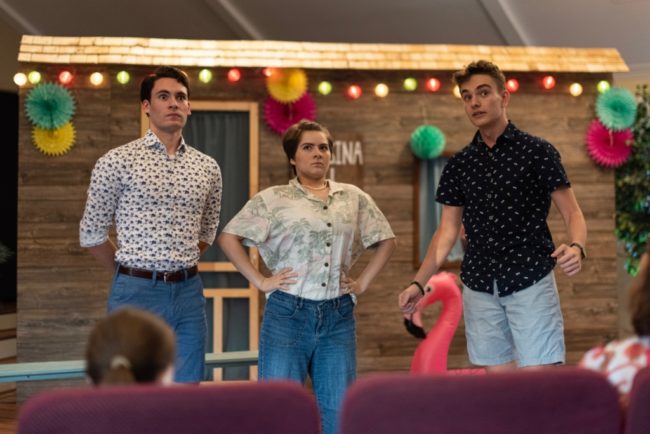
Full of noble spirit and yet a playful nature, when Don Pedro (Josh Bates) sets his company down to Camp Messina, at Messina Hall, antics and shenanigans are bound to ensue. Bates, who is ever the epitome of a leading Captain, transforms quickly into that boyish leader of the campers; the impressive jock whom all the girls want to swim with, and all the boys wish they could be. When Bates is set upon by his character’s brother, Don John, the way he deigns to look down upon him, like he’s the obnoxious little brother who was by some mistake allowed to come to the cool kids camp, is priceless. Holding reverent ground in the row between he and Prince Claudio and the sisters Leonata and Antonia, Bates showcases his performance versatility and malleability well.
A true force to be reckoned with, Juliana Schueckler is as bold and brave as any male taking up the role of Leonato. For this production, Schueckler is Leonata, the fiercely fiery mother of Hero, and her mostly mousy sister, Antonia (Grace Wagner) the aunt of all ladies from Messina Hall. Schueckler is spirited, tame and well-tempered when the season of the scene calls for it, but when the plots twists diabolically about— transforming comedy to tragedy— there is an unquenchable rage that surges up in the form of fury and fire, belching forth from Schueckler first at Hero and later at Don Pedro and Claudio. Wagner, as the mild and sweet sister Antonia, lets her true ice-queen reign during that dust-up between the Messina Hall deities and the Don and his Prince, blazing full-speed with gut-roaring anger and passion.
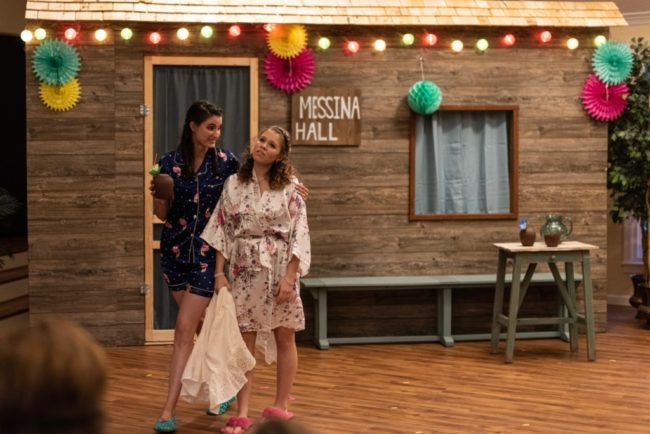
Sweet, delicate Hero (Abigail Pimpo) runs the risk of being the easily dismissible, dopey-eyed gooey-gal ingénue that such Shakespearean women are oft wont to be. But not with Pimpo’s portrayal. Though delicate when the character is meant to be, earnest and true in the confession scene at the church, there is some of Leonata’s vibrant spirit housed within Pimpo’s rendition of this Hero. It radiates through particularly well during the guiling of Beatrice scene, which is painted up divinely using actual easels and paints! (Everyone paints at summer camp, just like everyone plays with pool floats and goes kayaking, so why not?) Pimpo plays brilliantly opposite Claudio (Adam Harrison), who is sincere in his flattery, noble in his courtship, and brutal in his backlashing. Harrison, who has animated facial expressions beyond compare, lives fully in each of his character’s moments. Watch his face and body language closely during the confrontation with the Sexton, where “news” is revealed; the dramatic transition is too good for words.
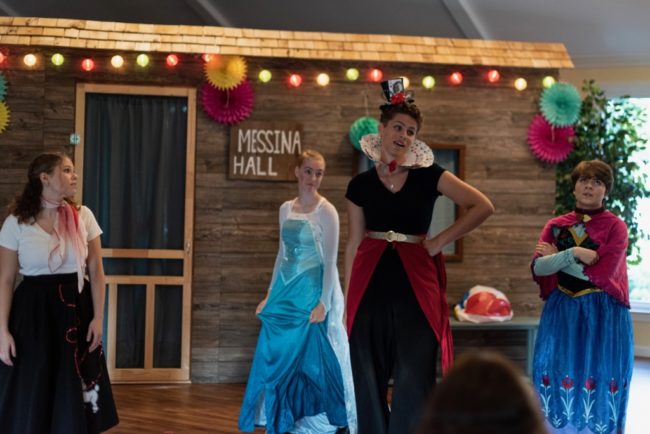
Fire and brimstone could not mold Beatrice as more of a termagant than Audrey Kawecki has done. Shrewish, quick-tongued, and wholly unpleasant (of course, until she becomes struck stupid with cupid’s dippy little arrow over Benedick), Kawecki demonstrates a keen understanding of both the character and Shakespeare’s dialogue. Zapping each of Beatrice’s insulting zingers with gusto, slinging them so hard they dare not be returned to her by any measure, Kawecki is her own tropical storm raining down largely upon Benedick. Though there are layers of depth to Kawecki’s portrayal of Beatrice as well; this makes for a pleasant surprise as all too often actors present only the toughened exterior of the shrew refusing love. Kawecki finds a tender side, particularly when dealing with Hero later in the performance, and even uncovers hints of twitterpation, that inexcusable giddiness that too often accompanies ‘true love.’ Remarkable in her volatile chemistry created with Benedick, Kawecki drives the production with her stellar performance.
He that hath a beard is more than a youth, and he that hath no beard is less than a man, but what about he that hath donned Marilyn Monroe’s getup— including a hideodious wig that makes roadkill look pristine— and prances about the masquerade scene in a falsetto singsong voice flipping facial expressions faster than a trendy pop song’s backbeat? That he, would be Benedick (Ian Cripe.) There is an undeniable charm about the way Cripe presents this cocky, but not too big of a jerk, character of Benedick. There is an honesty there as well. His comic timing, comic understanding, and overall comic execution is exquisite, making him the epitome of a witcracker in this production. The entirety of the Benedick guiling scene— which one may find too hysterical to pay proper attention to, between the utter shenanigans of Leonata seemingly not remembering what it is she’s meant to say and needing desperate urging and coaching from her two scene companions, and everything else happening with Benedick, good luck— is a scream in the hands of Ian Cripe and company. Outstanding moment? Three-way tie between the Flamingo-Float Fight he shares with Girl (Heidi Wagner), the diving into and subsequent shenanigans of the kayak, and the worm-scooting across the floor underneath the towel. But Cripe, like many of his fellow castmates, possesses a deep emotional bench when it comes to playing Benedick; there is a sharp and sudden transformation once the play gets serious, and the depth of what is often labeled “true Shakespeare” surfaces in his otherwise comedically cracked character. Versatile, hilarious, and physically engaging, Cripe brings to bare the whole package when it comes to playing Benedick.
Let it be writ in black and white that this production is an a— bsolutely fabulous performance of Much Ado About Nothing. Moreover, Storytellers: A Theater Arts Academy has committed hysterical shenanigans upon the boards; secondarily, they have spoken brilliant Shakespearean truths that ring true from the tongue to the ear; sixth and lastly, they have delivered unto their audience a hilarious good time; and to conclude, they are deeply entertaining and tickets to their fine production should be procured immediately, lest you be called ass for missing their show!
Running Time: Approximately 2 hours and 10 minutes with one intermission
Much Ado About Nothing with Storytellers: A Theater Arts Academy through July 20, 2019 at Christ Reformed Presbyterian Church— 1102 Montgomery Street in Laurel, MD. Tickets are available at the door or in advance online.

